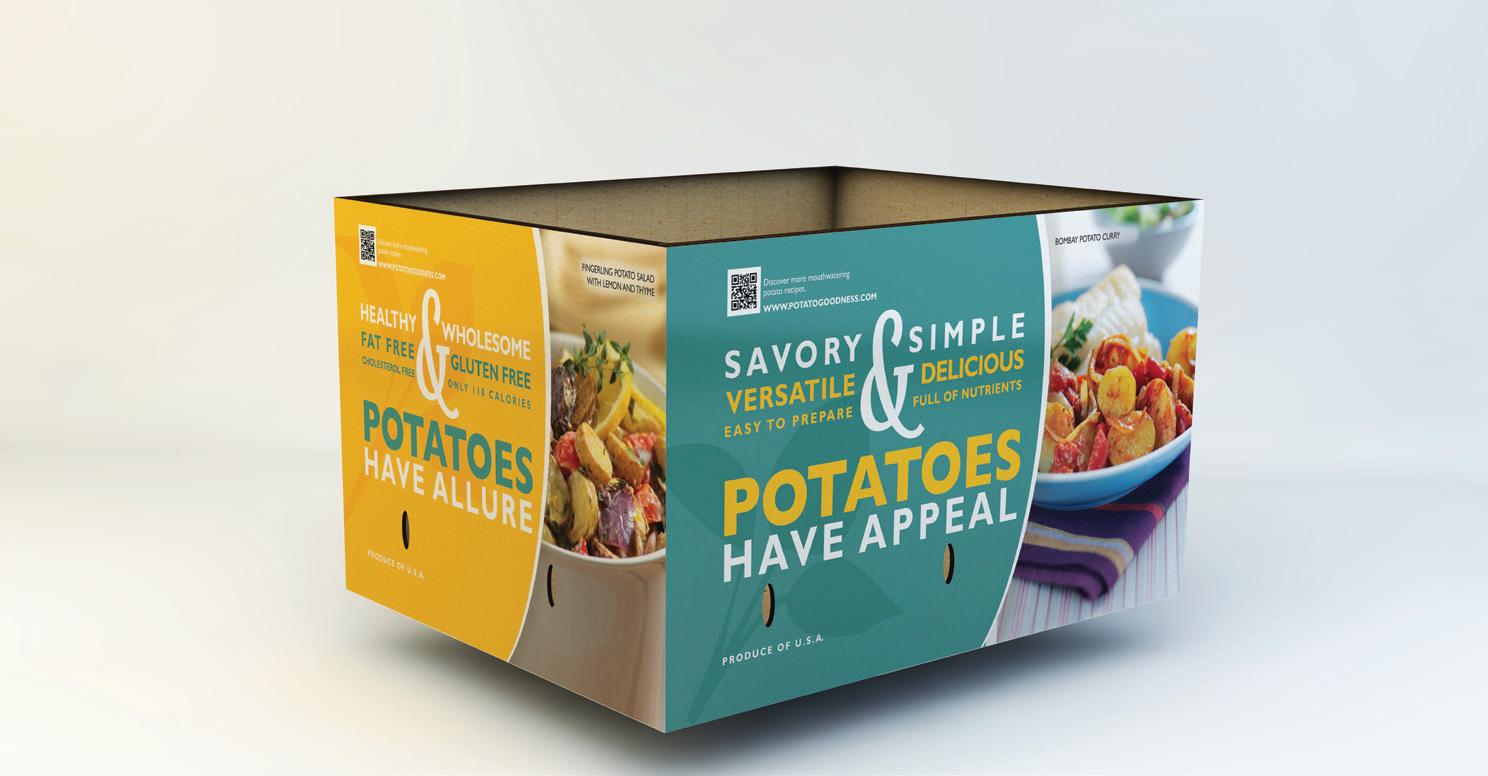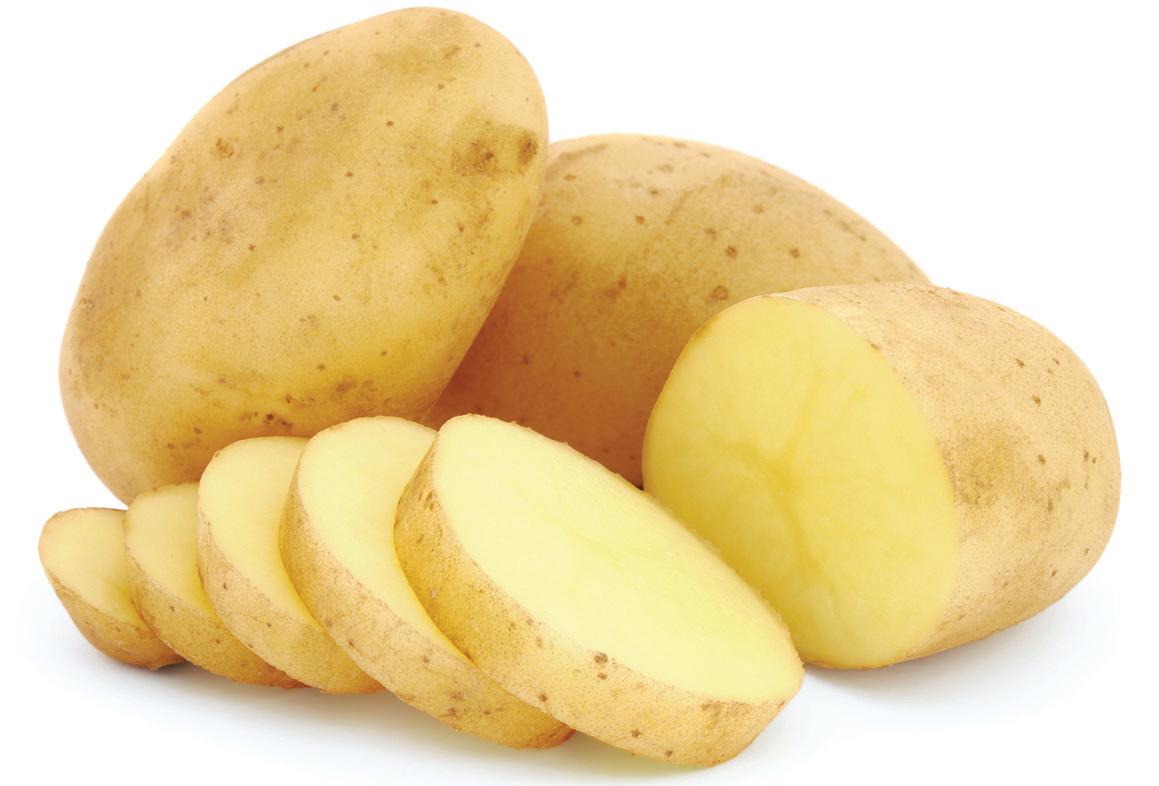
25 minute read
OUTSTANDING WOMEN of Wisconsin Agriculture, Part II, features impressive duo
Outstanding Women of Wisconsin Agriculture
Part 2 of a 2-Part Series That Began in the April 2020 issue
Advertisement
An impressive group continues
to further potato and vegetable
production in the state
By Joe Kertzman, managing editor, Badger Common’Tater
Continuing a feature that began in the April Badger Common’Tater, two more spectacular women were interviewed this time, each of whom fills an important position or positions in the Wisconsin potato and vegetable growing industry.
HEIDI ALSUM-RANDALL Chief Operating Officer, Production, Sales, Human Resources and Purchasing, Alsum Farms & Produce President of the Wisconsin Potato Industry Board
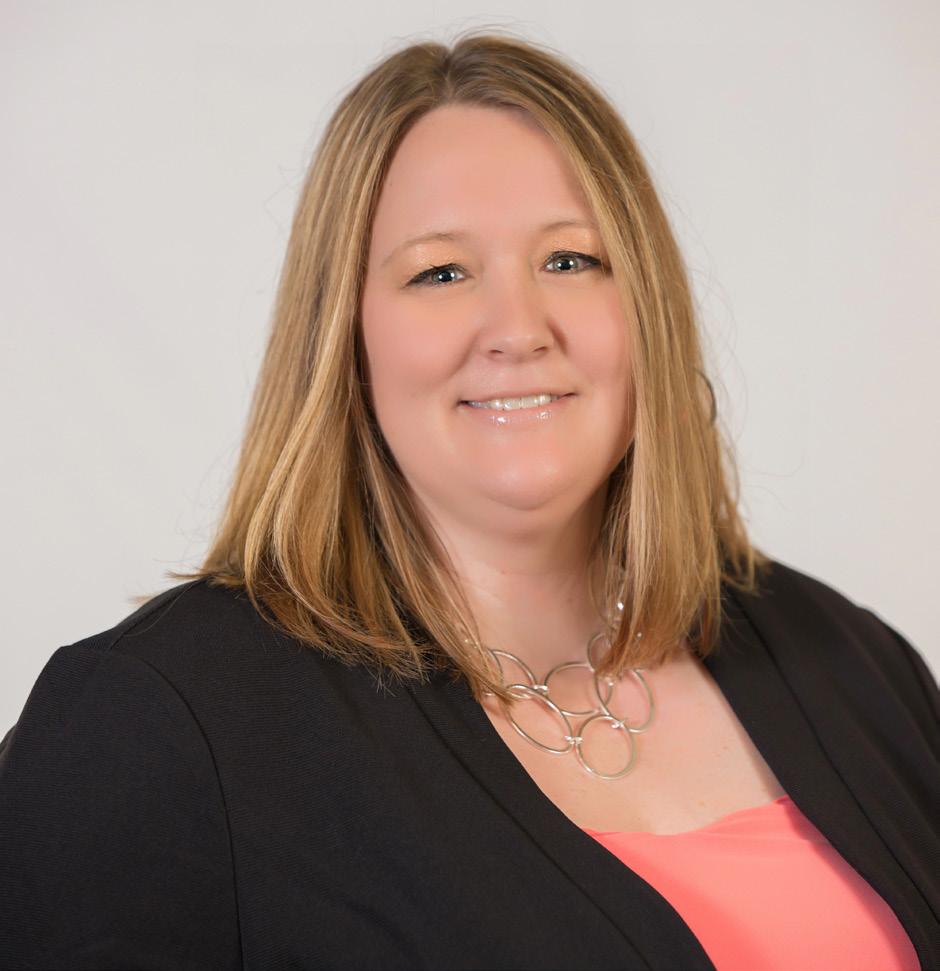
The first female president of the Wisconsin Potato Industry Board (WPIB), Heidi Alsum-Randall is chief operating officer of Alsum Farms & Produce in Friesland, Wisconsin, concentrating on the production, sales, human resources and purchasing sides of the business.
“I currently share the chief operating officer role with my sister, Wendy Alsum-Dykstra,” Randall says. “She oversees our logistics and maintenance divisions and is involved in the finance department.”
Randall, who has a Bachelor of Business Administration in Human Resource Management degree, worked as a recruiter for WPS Health Insurance Company and then as a fleet manager for deBoer Transportation. 24 BC�T May
On a state level, she has served as a director of the WPIB since July 2011 and as president beginning in 2014. Randall has been involved in the Wisconsin Potato & Vegetable Growers Association (WPVGA) Promotions & Consumer Education Committee since 2006.
Beginning in 2015, she’s represented Wisconsin on the Potatoes USA Board of Directors, serving in various capacities, including on the Domestic Marketing Administrative Committee.
In 2018, at the March Annual Meeting, she was elected to serve on the Potatoes USA Executive Committee as co-chair of the Industry Outreach Committee and continues to work in this capacity.
Not only is Heidi Alsum-Randall the firstever female president of the Wisconsin Potato Industry Board, but she also currently represents the state on the Potatoes USA Executive Committee.
have really enjoyed the opportunity to serve and interact with other growers, packers and shippers throughout the United States,” she says.
When asked about being the first female president of the WPIB, Randall replies, “I’m humbled that I was able to earn the respect of the other WPIB directors to be asked to serve in this capacity.”
PROGRESSIVE INDUSTRY
“I think it also shows how progressive the potato industry and farmers in
Heidi Alsum-Randall, standing at far back-left facing the camera, addresses international chefs who visited the Alsum Farms & Produce offices and packing shed during a 2019 Potatoes USA Reverse Trade Mission.
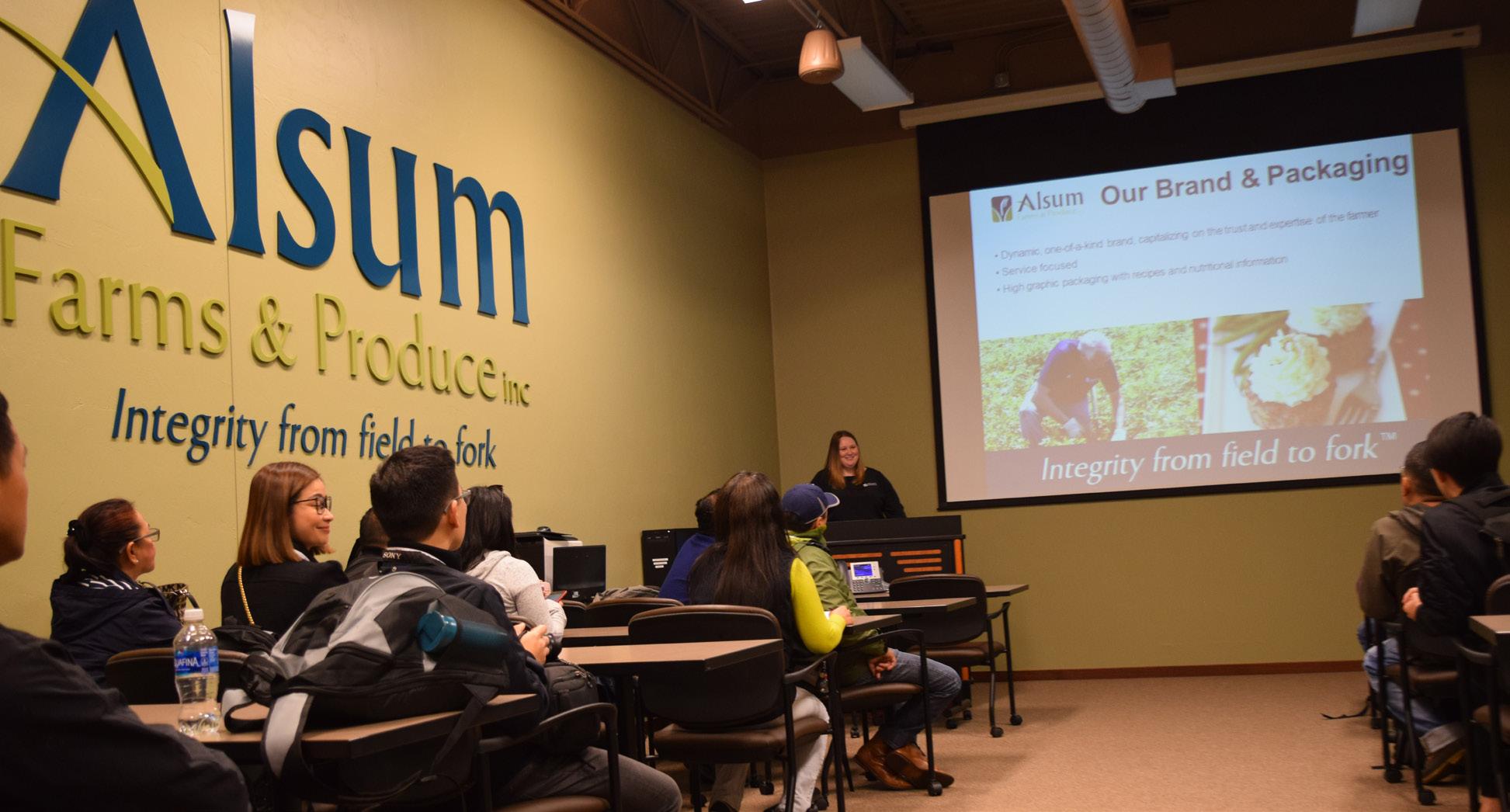
general are,” she adds. “I appreciate how the potato industry recognizes the need to continually develop the next generation of leaders, whether female or male, and provides opportunities for younger leaders to serve.” “I absolutely love being part of our family farm and business and the Wisconsin potato and vegetable industry,” Randall says. “I feel privileged to work alongside my dad, sister, brothers, aunt and so many other passionate individuals.” “In general,” she suggests, “potato growers are collaborative, and this is especially true in Wisconsin where we have earned a reputation in the potato industry because of how well we work together.”
Another reason Randall says she enjoys being part of the industry is that things are constantly changing, and every day is different.
Career-driven by nature, Randall has worked in some capacity since she was 12 years old, such as grading potatoes many summers and throughout the fall in elementary and high school.
In college, she waitressed as well as worked with adults who had developmental disabilities, and Randall would return home on weekends to work in the office.
“My parents instilled a strong work ethic in my siblings and I,” she says,
continued on pg. 26
YOUR PARTNERS ON THE JOB!
GENESIS ® T8 INTRODUCING THE NEW WITH PLM INTELLIGENCE • Advanced Connectivity • Customizable Controls • Increased Visibility • Enhanced Comfort Take Control in the Luxury Performance Cab

Team Swiderski has the largest inventory of new and used New Holland tractors in Wisconsin. Call or visit today. Mosinee: 715.693.3015 • Wausau: 715.675.2391 • Thorp: 715.669.5255 • Antigo: 715.623.4668 • Waupaca: 715.258.3266
“and I am extremely grateful for that. I knew I wanted a career that was purposeful, and for me, that was either working with children or adults who have developmental disabilities or working for the family business.”
BEING A GOOD LEADER
In her career at Alsum Farms & Produce, she sets small goals for herself related to different areas of the job, trying to be the best leader that she can.
Randall also set goals with each of her team leaders and reviews them throughout the year to make sure she is challenging each employee in the areas that are important to them for personal and professional growth.
“I enjoy interacting with all
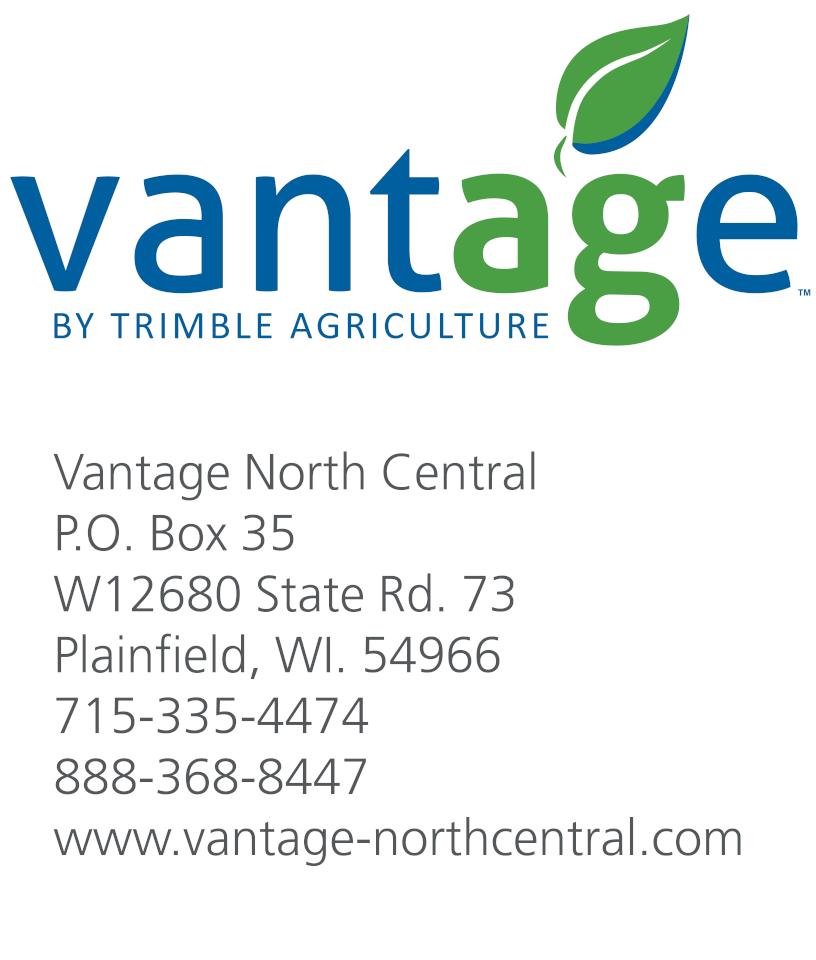

departments of our company,” she says. “Each day brings different challenges and opportunities as I continue to learn more about our company and the industry.”
“I appreciate the fact that I’m given an opportunity to challenge myself and grow professionally and personally,” Randall relates.
“As a whole,” she continues, “I feel agriculture has advanced through the decades, embracing women working in the industry. I respect leaders, whether male or female, for their skills and abilities and appreciate working with all growers to advance the industry.”
Randall says she’s also proud of the collective strength of the Wisconsin potato industry, pointing out that the state’s growers were leaders in bringing IPM (Integrated Pest Management) standards and practices in potato farming in the mid-1990’s, remaining committed to the program today.
She references the WPVGA Promotions Committee, which, after several years of planning, was able to launch the Spudmobile as an educational tool for the Wisconsin potato industry to utilize at a variety of different events (school, retail, community, etc.).
The purpose of the Spudmobile is to educate consumers about farming and where their food comes, making meaningful connections from field to fork.
“Looking to the future,” Randall concludes, “with discussions of joining the Madison Public Market, I am excited about possibilities and venues to introduce new consumers to the healthy and nutritious products that we grow with a yearround presence.”
Lynn Leahy, who grew up on a typical small Wisconsin dairy farm in Argyle, Wisconsin, knew by middle school that she wanted to work in agriculture off the family farm.
She attended the University of Wisconsin-Madison to pursue a degree in dairy science, and while there, played in the marching band.
“I was looking for an internship during the summer between my senior year of college and final semester,” she relates. “I stumbled upon a Heartland Farms internship posting on the university student job site.”
“I completed my bachelor’s degree in 2010,” Leahy says, “and the rest is history! I attribute where I am in my career to a lot of hard work, grit
and commitment to life goals, as well as the farm managers at Heartland willing to take a chance on me.”
“I had the opportunity to obtain my master’s degree in horticulture while at Heartland Farms, which I completed in 2016 on stem-end defect in potato chips,” she explains.
Leahy has been active in many organizations, such as 4-H, FFA, the Association of Women in Agriculture, Sigma Alpha and the Wisconsin Farm Bureau Federation, allowing her to connect with agricultural professionals, and grow and develop leadership skills essential to progressing in her career.
As the head research agronomist at Heartland Farms, she is responsible for managing small-plot field trials
The head research agronomist at Heartland Farms, Inc., Lynn Leahy attributes success in her career to hard work, grit and commitment to life goals, as well as the farm managers at Heartland Farms taking a chance on her.
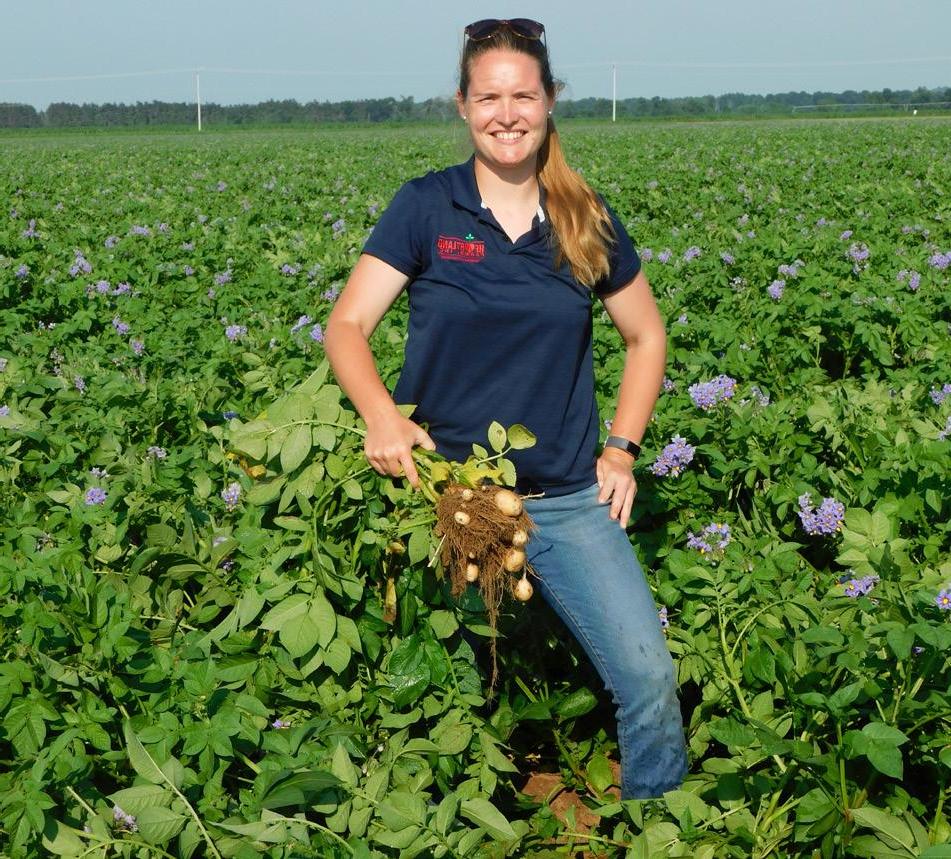
from inception to the final data reports.
continued on pg. 28 “A large portion of my responsibilities involves collecting samples and data and maintaining the spreadsheets for a portion of the data,” she explains.
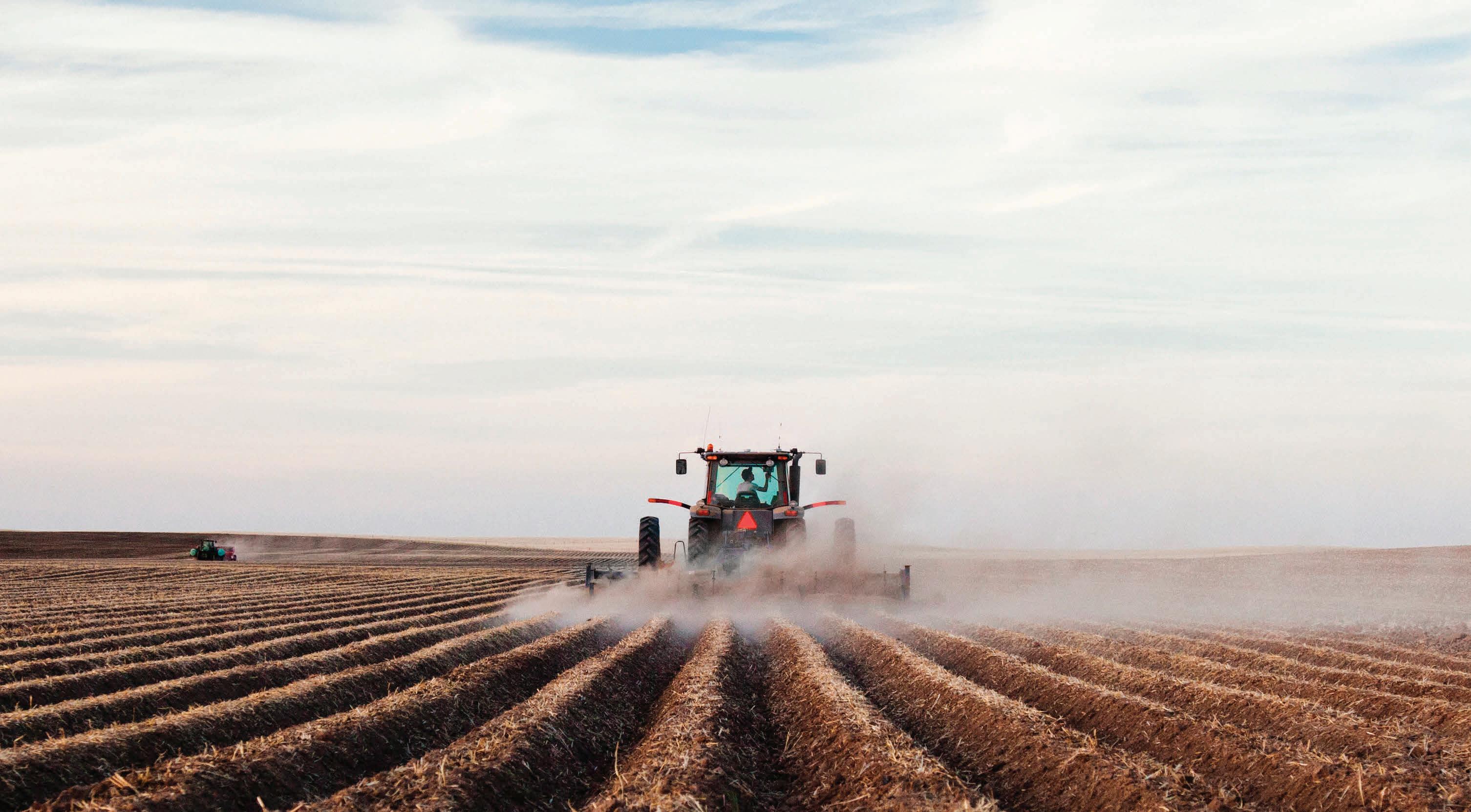
Rural Mutual has been protecting farms like yours across Wisconsin for 85 years with customized farm coverage. We Are Wisconsin Strong
Premiums Paid Here, Stay Here to Keep Wisconsin Strong Visit RuralMutual.com to learn how we help keep Wisconsin agriculture strong.


DATA COLLECTION
Some of the main categories for which she collects samples and data include emergence, canopy cover, stem counts, bulking curves, new varieties, bruise-free numbers during harvest and sugars in storage.
“As an agronomist, I strive to keep up with all current research being published,” Leahy notes.
She served on WPVGA’s research and SpudPro committees, and in 2017, was selected as a participant in the Potato Industry Leadership Institute (PILI).
“I was able to have great exposure to Maine and Maine’s potato industry during the institute. It opened my eyes to the similarities and differences between our states’ industries,” she says.
As part of PILI, Leahy attended the Potato D.C. Fly-In, where she learned about the National Potato Council and all the individuals who help lobby for grower-friendly legislation.
“In the future, I would like to be a member of the WPVGA Board,” she says.
“I am proud to be able to push the envelope and the boundaries and show that women can be involved in the industry,” Leahy remarks.
MALE-DOMINATED INDUSTRY
“I hope that I give confidence to the many women who follow me,” she adds, “that you not only can work in a male-dominated industry, but also thrive. You can learn anything and do many more things than you think possible!”
With a dairy background, Leahy says the potato industry is a smaller, more tightknit group.
“I have enjoyed getting to know many people in the potato community, and because we have a tightknit relationship with researchers and professors, ideas flow from farm to 28 BC�T May
researchers and back,” she notes.
As a result, the research being completed is pertinent to the industry.
With potatoes being an intensive crop to raise, store and market, Leahy says she enjoys the challenge of finding solutions to problems that arise daily.
“We always have new varieties and equipment, and different consumer trends and weather every year,” she exclaims. “All of these issues require adaptation, and it keeps the job fresh and interesting.”
“I like to feel as though I’ve accomplished something at the end of the day—to have contributed to something that is helping society,” Leahy says.
“In my case right now,” she adds, “it’s knowing that everyone who wants delicious potato chips has them available to buy whenever they want. Granted, eating a family-size bag every day is not recommended.”
HURDLES FOR WOMEN
When asked if there are hurdles women face in agriculture that guys don’t, Leahy explains, “One of the big obstacles we as women are still overcoming is being taken seriously as the primary decisionmaker and farmer on an operation.”
“According to the 2018 Census of Agriculture,” Leahy continues, “38 percent of the primary producers and farmers are women. In another 25 years, I believe this hurdle will be eliminated.”
“I know many women who are my age and younger that manage a farm while their significant other brings in outside income. Even in my 10 years in the workforce, I am seeing more women out in the field or at meetings,” she notes. “It is a very exciting time in agriculture.”
As part of the Potato Industry Leadership Institute, Lynn Leahy, shown standing in front of the U.S. Capitol, attended the D.C. Fly-In, where she learned about the National Potato Council and individuals who help lobby for grower-friendly legislation.

Out of the nine interns Heartland Farms has hired since 2016, Leahy says only two have been men.
“The other obvious barrier we face is having to take time off to have and raise children,” she reasons, “which can be minimized if everyone works together, coworkers and spouses, to share the responsibility of the workload and parenting.”
“Raising our next generation of Americans is also a very important job in addition to working in agriculture,” Leahy surmises.
When she landed an internship in the potato industry, Leahy admits knowing nothing about potatoes beyond that there were different kinds in the grocery store. She acknowledges being proud of everything she has learned over the past 10 years working in the field.
“Taking advantage of the opportunities I have been given in the Wisconsin potato and vegetable growing industry has allowed me to live the life that I envisioned for myself when I graduated from college a decade ago,” she concludes.
ACCOMPLISH ® LM is a fertilizer biocatalyst designed to significantly increase fertilizer availability and overall plant performance. Accomplish LM contains concentrated biochemistry in an easy-to-handle liquid formulation optimized for At-Planting fertilizer applications.
FEATURES:
Powered by Fertilizer Biocatalyst Technology Compatible with most fertilizers, herbicides, fungicides, and insecticides Consistent performance across crop and soil types
RISER ® (7-17-3 + Zn, Mn, Cu, Fe) is a low salt, seed safe, highly pure At-Planting fertilizer containing Acetate ® Technology and Chelated Micronutrients. Riser provides the developing crop with essential nutrients for optimizing seeding emergence, crop quality and marketable yields.
FEATURES:
• High quality pure fertilizer • Excellent crop safety • Low salt blend that’s seed and root zone safe • Utility across a broad range of crops
GROWER BENEFITS:
• Improves nutrient availability and uptake • Enhances nutrient-use efficiency • Promotes better root growth and development • Designed to enhance applied fertilizer applications
Apply 1-2 qts/A with At-Planting or Banded Nutrition; 2-3 qrts/A with manures or poultry litter
GROWER BENEFITS:
• Phosphate and key micros drive growth and metabolism in many crops • Drives early season plant emergence • Increases root mass and nutrient uptake
RATES
Soil Application - Cereal Grains: 1-5 gal/A in-furrow or 2x2. Specialty Crops: Soil: 2-8 gals/A.
Riser + Accomplish LM Performace in Potatos 2017
Marketable Yield (lbs)
124
5.14
Avg Tuber Wt. (oz)
168
6.6
Grower Standard Fertilizer Riser + Accomplish LM
9
8
7
6
5
4
Tuber Wt. (oz)
3
2
1
0
Riser + Accomplish LM: Potatoes
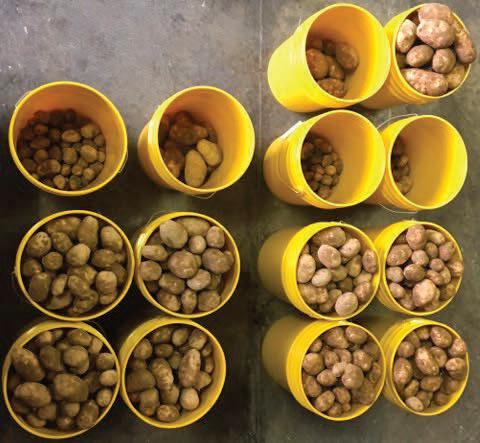
5 Gal 6-24-6 + 1 qt Zn
Hersom Road Trial 5 Gal Riser + 1 qt Accomplish LM
New Products Nachurs Receives Potassium Acetate Patents
Method of fertilizing crops makes use of versatile high-potassium liquid fertilizer
Nachurs Alpine Solutions® (NAS), a division of Wilbur-Ellis, announces it has received two patents from the United States Patent and Trademark Office for its potassium acetate technology.
This technology is a method of fertilizing an agricultural crop using an environmentally friendly and versatile high potassium-content liquid fertilizer. Specifically, these patents pertain to the use and application of potassium acetate, either alone or mixed with other nutrients such as nitrogen and phosphate. Plants extract a variety of nutrients from the soil to maintain healthy growth and development. With vital nutrients becoming less plentiful in soil, it is important to provide supplemental nutrients to the crop throughout its stages of development.
Potassium is required by a growing plant to stimulate early growth, increase protein production and activate enzyme and hormone systems within the plant.
IMPROVED RESISTANCE
These systems impact the plant’s ability to withstand biotic and abiotic stress and improve its resistance to diseases and insects. Potassium also increases the efficiency of water use and transforms sugars to starch.
Additionally, potassium acetate results in lower phytotoxicity damage compared to other sources of potassium for liquid fertilizer products. It also may be applied in a variety of ways, including in-furrow, foliar, side-dressed, soil injected, broadcast, fertigation or other applications.
Lab tests and field trials have proven potassium acetate to be an effective and safe source of potassium for crop production. NAS potassium acetate technology is branded in the U.S. as NACHURS Bio-K® and in Canada as ALPINE K-Tech®.
To learn more about NAS’ full line of potassium acetate products, call 800-622-4877, Extension 233, or visit www.nachurs.com or the ALPINE® website at www.alpinepfl.com.
About the Wilbur-Ellis Companies
Founded in 1921, the Wilbur-Ellis companies are leading international marketers, distributors and manufacturers of agricultural products, animal nutrients and specialty chemicals and ingredients. By developing strong relationships, making strategic market investments and capitalizing on new opportunities, the Wilbur-Ellis companies have continued to grow the business with sales of over $3 billion. For more information, please visit www. wilburellis.com.
About Nachurs Alpine Solutions®
Nachurs Alpine Solutions (NAS) became a division of Wilbur-Ellis in 2019. NAS is a 73-year-old specialty chemical business that pioneered the low salt liquid starter fertilizer industry by introducing the first true solution liquid NPK fertilizer. Today, NPK liquid fertilizers sold by NAS are marketed under the NACHURS brand in the United States and under the ALPINE brand in Canada. For more information, visit www. nachurs-alpine.com.


Potatoes from two side-by-side plantings are shown. Both crops had a NACHURS in-furrow fertilizer applied at 9 gallons/acre during planting. However, the potatoes on the left also received a foliar treatment of 2 gallons/acre of NACHURS Bio-K®, as well as 1 quart per acre of NACHURS Finish Line product at tuber initiation. As the photo illustrates, the crop on the left shows more weight, tubers and marketable yield as a result of the foliar application. (Note: Finish Line is a unique, micronutrient-enriched premium foliar fertilizer containing proprietary organic acids, compatibility agents and a higher level of micronutrients).
Jet-Oxide Sanitizer Fights Coronavirus
Marrone Bio Innovations product allowed for use on industrial hard surfaces
Marrone Bio Innovations, Inc., Scientific studies have suggested
a leading provider of effective and environmentally responsible pest management and plant health products, announces that its Jet-Oxide® 15% post-harvest sanitizer and industrial disinfectant product is now allowed by the U.S. Environmental Protection Agency (EPA) for use against human coronaviruses to sanitize industrial food and agricultural hard surfaces. The allowed use was based on a study conducted by the EPA with Human Coronavirus Strain 229E (one of the viruses associated with human colds) on the effectiveness of spreading of diseases on hard surfaces. The study, conducted at a sanctioned EPA laboratory, met all requirements for 40CFR 160—yielding a 99.99 percent reduction of Human Coronavirus Strain 229E. The study was conducted using a dosage of approximately 1,300 parts per million (.130 percent) of the active ingredient with a contact time of 60 seconds at an ambient temperature of 72 degrees Fahrenheit. that coronaviruses, a group of related viruses that cause respiratory diseases in humans, are spread most often by respiratory droplets in a cough or sneeze.
VIRUS ON HARD SURFACES
Depending on the strain of coronavirus, this virus can survive up to several days on hard surfaces such as glass, metal or plastic. This may pose a threat to humans, particularly when the hard surface is not properly disinfected. Jet-Oxide is a fast acting, easy-to-use post-harvest sanitizer and industrial disinfectant that is used for the treatment of raw, unprocessed fruits and vegetables, as well as surfaces, equipment and machinery where produce is processed and packaged. Jet-Oxide also provides an excellent sanitation treatment for fruits and vegetables during storage. As the product biodegrades, all compounds used in Jet-Oxide are environmentally friendly. Jet-Oxide 15% is available through Marrone Bio Innovations agriculture channel partners and local retail branches. 20-05 Badger Common'Tater .25page AD (7x3).v1.pdf 1 2020-04-03 3:25 PM

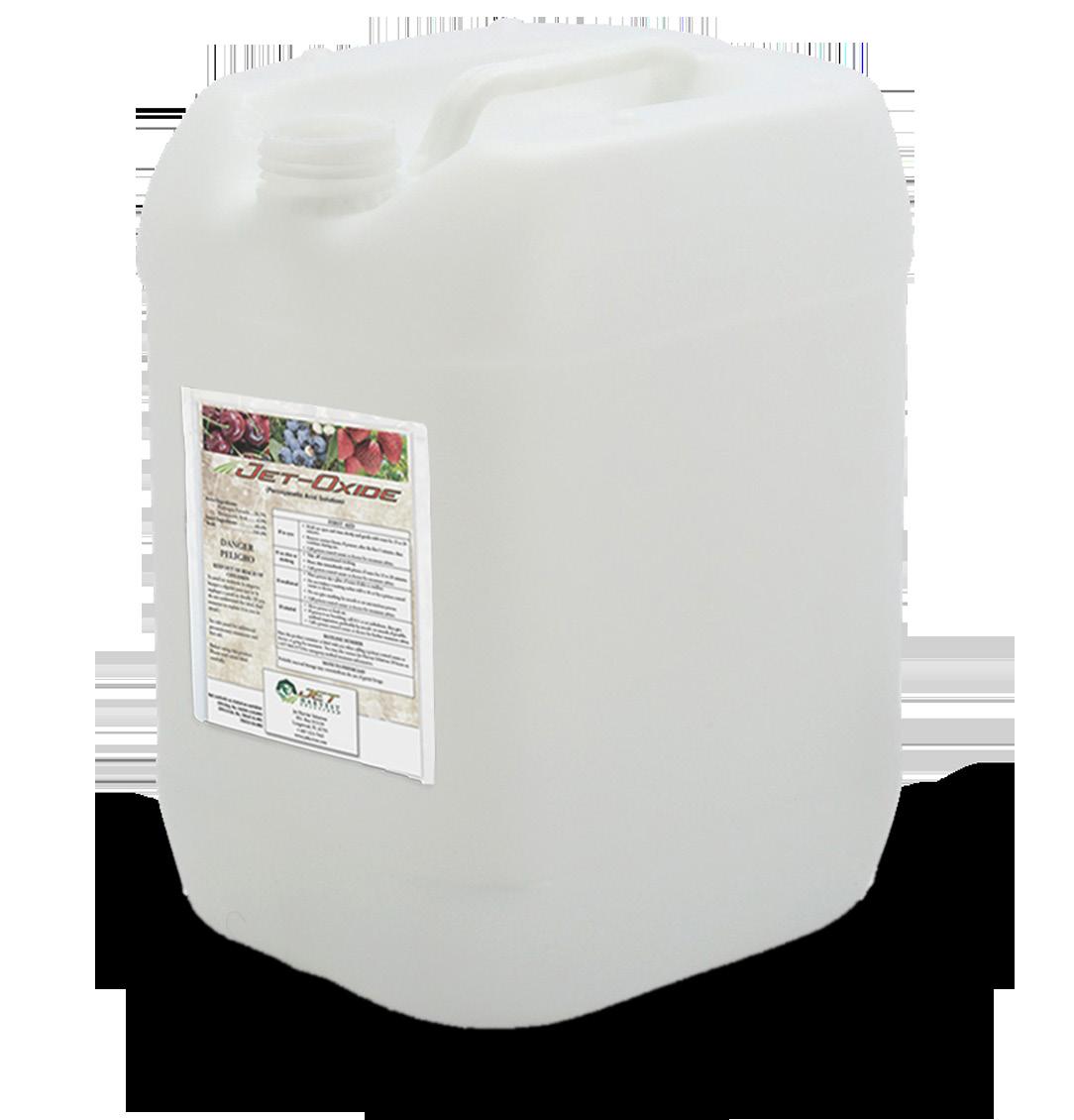
Jet-Oxide 15% (EPA # 54289-4-81803) is a supplemental registration of PERACLEAN® 15 (EPA #54289-4). EPA approval can be found by visiting: https://www.epa.gov/pesticideregistration/list-n-disinfectants-useagainst-sars-cov-2.
Learn more about Marrone Bio Innovations at www.marronebio.com. Follow us on social media: Twitter, LinkedIn and Instagram.
HALF-N-HALF ® BAGS
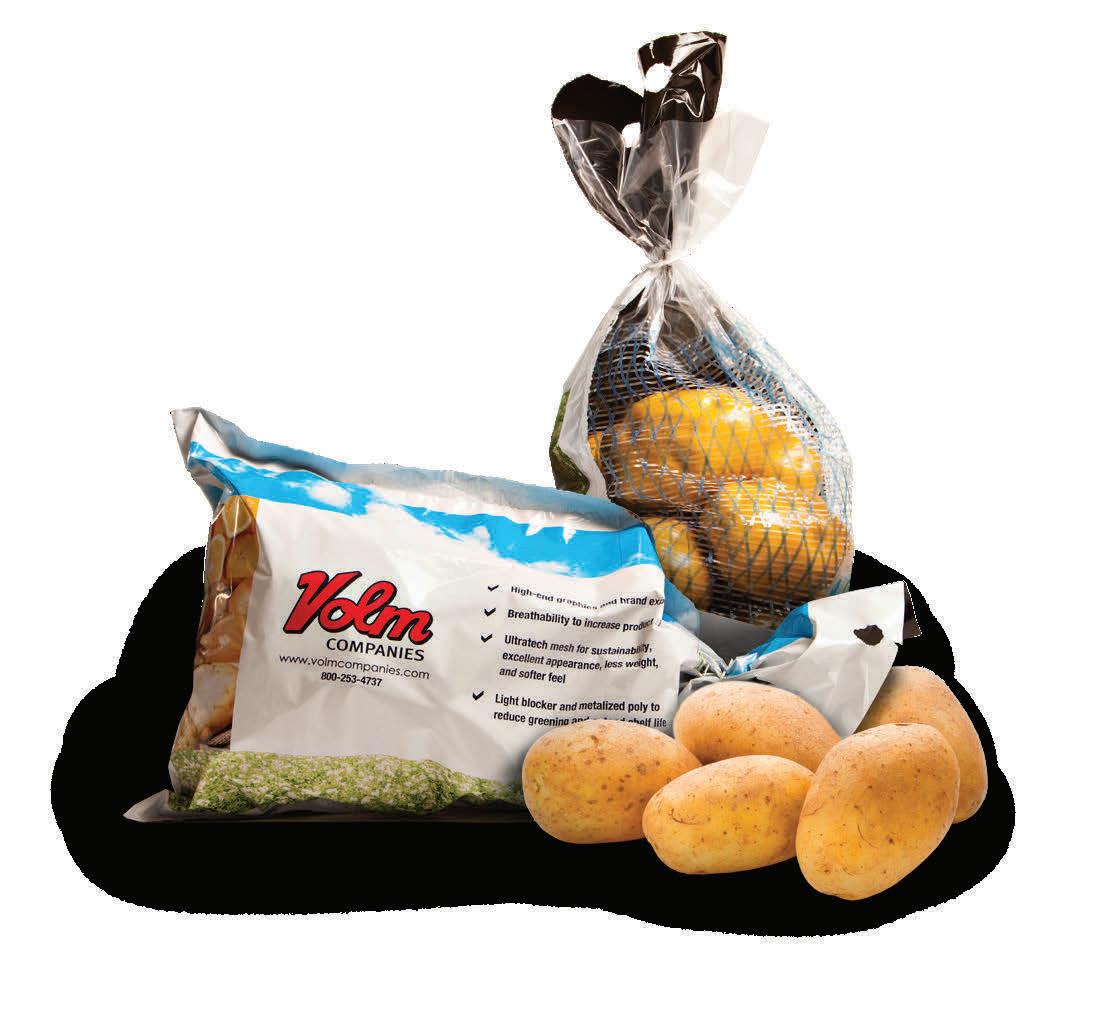
ORIGINAL A M E R I C A N OUR ALL
Keeping produce fresh
NPC Launches #EssentialAg Campaign
Initiative recognizes those keeping America’s food supply safe
Growing and packing nutritious potatoes for families, and employing over 200 workers who live in Wisconsin, Alsum Farms & Produce is one in hundreds of operations across America that are #EssentialAg.
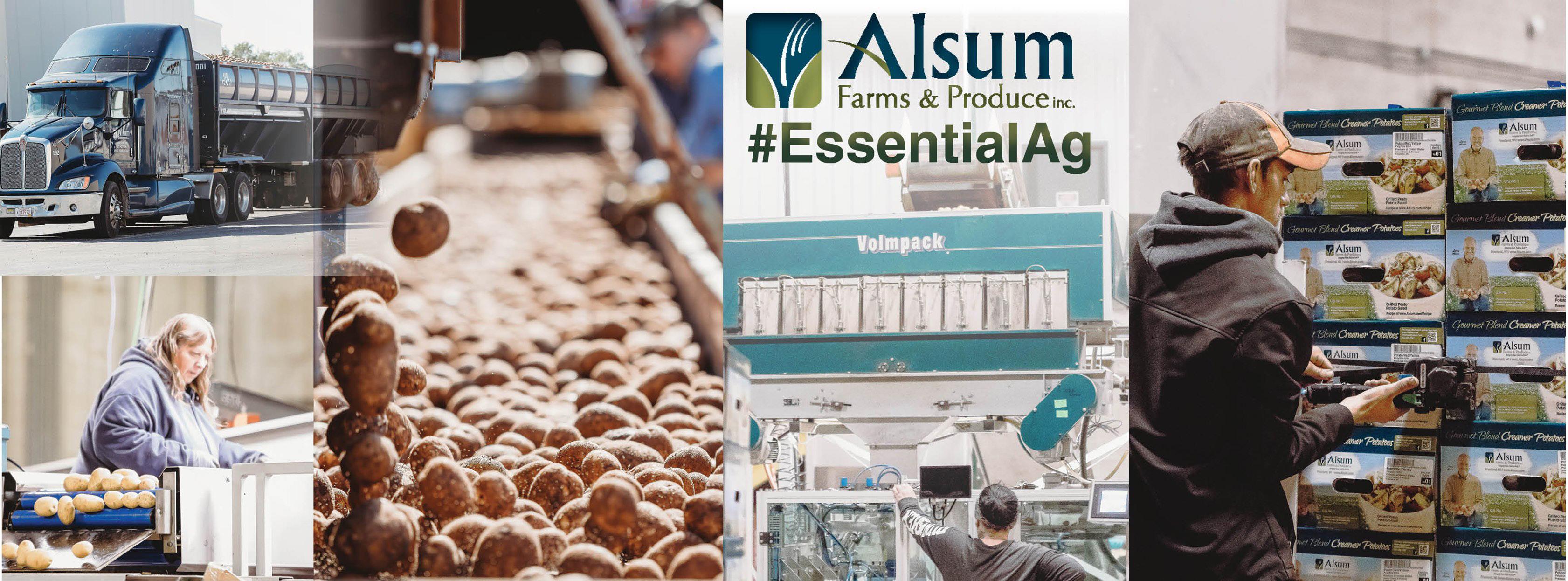
In recognition of National Agriculture Day, March 24, the National Potato Council (NPC) launched a new social media campaign to thank all of those working to keep America’s food supply safe, secure and abundant.
The campaign, called #EssentialAg, aims to thank the men and women of the U.S. food supply chain who are rightfully considered “essential workers” every day, but particularly so during the current COVID-19 pandemic.
NPC CEO Kam Quarles said, “In normal
NELSON ’ S EGETABLE V
TORAGE S
YSTEMS INC. S
N7158 6TH DRIVE P.O. BOX 215 PLAINFIELD, WI 54966 OFFICE: (715) 335-6660 FAX: (715) 335-6661 SPROUT INHIBITING • FRUIT GUARD APPLICATIONS • SMART BLOCK APPLICATIONS • CIPC, CLOVE OIL APPLICATIONS
KEEP ON TRACK WITH OUR SPROUT INHIBITORS AND DISINFECTANTS
STORAGE VENTILATION • COMPUTERIZED CONTROL PANELS • HUMIDIFICATION • REFRIGERATION
AGRI-VENTILATION SALES AND SERVICE AGRI-VENTILATION SALES AND SERVICE 24 HR. EMERG. SERVICE
times, Americans are fortunate to see their grocery store shelves wellstocked throughout the year. That security exists due to the men and women of American agriculture.”
“It is particularly valuable now in this time of crisis to highlight these proud individuals who are working relentlessly to see stores full again,” Quarles maintains. “The President and Secretary Perdue have rightfully stated that American agriculture is essential in this time of crisis, and indeed it is.”
Examples of #EssentialAg social media posts can be found on the NPC Facebook, Twitter and Instagram feeds.
How you can get involved: • Send NPC a photo that the organization can post of you or your operation and include a description of how your work is essential to the U.S. food supply chain. Email info@ nationalpotatocouncil.org. • Post a photo on your social media channels with the tag #EssentialAg and tell us how you’re helping feed America.
On April 6, NPC joined 74 specialty crop organizations in a letter to U.S. Secretary of Agriculture Sonny Perdue recommending strong relief measures under the Phase 3 Stimulus Bill dedicated to the fruit and vegetable industry.
Joining on the letter were potato state associations including the Colorado Potato Administrative Committee; Idaho Grower Shippers Association; Idaho Potato Commission; United Potato Growers of Idaho; Maine Potato Board; Michigan Potato Growers, Inc.; Minnesota Area II Potato Council; Northern Plains Potato Growers Association; Empire State Potato Growers; North Carolina Potato Association; Oregon Potato Commission; Pennsylvania Co-operative Potato Growers; United Potato Growers of America; Virginia Potato & Vegetable Growers; Washington State Potato Commission; and Wisconsin Potato & Vegetable Growers Association.
“NPC has been working with our potato industry allies and the broad specialty crop industry on a plan for USDA to support our growers. A priority is to quantify the size of the likely losses and secure a substantial portion of the agriculture relief funding to fill that hole,” says Kam Quarles, NPC CEO.
In April, the President signed the “CARES” Act (also referred to as the Phase 3 Stimulus Bill). That bill provides $2.2 trillion overall in increased federal spending. Within the bill is $9.5 billion for the agriculture industry. There will be fierce efforts by various commodities to secure that funding.
It is very likely that the U.S. Congress and the Administration will need to provide additional relief beyond the $9.5 billion. For example, the fresh produce industry estimates that $1 billion per week is lost just in that sector due to the pandemic shutdown and the impact inflicted largely on the food service sector at this time.
Disaster Loan Program Excludes Ag Businesses
NPC joined 30 agriculture organizations and businesses calling on the U.S. Small Business Administration (SBA) to include agricultural businesses in the Economic Injury Disaster Loan program, as intended by Congress in the CARES Act.
The notice on the SBA website currently states applicants must certify they are “not an agricultural enterprise [e.g., farm], other than an aquaculture enterprise, agricultural cooperative or nursery.”
Yet, the actual text of the CARES Act does not exclude agriculture producers and states all businesses with fewer than 500 employees can participate in the program.
In a letter to SBA Administrator Jovita Carranza, NPC and the agriculture organizations wrote, “Agricultural producers and businesses are critical elements of this nation’s economy and food system.”
“Prior to COVID-19,” the letter continues, “farmers and ranchers had already experienced a drastic 24 percent decline in net farm income
from highs experienced just six years ago. With the further downturn in the economy, agricultural businesses are at risk of closure and may be required to lay off employees.”
“This is an unprecedented crisis facing the United States,” says NPC CEO Kam Quarles. “Making this support program available to farmers, who especially now are so critical to our nation, is essential and must occur immediately to avoid more losses and insecurity in our food supply.” For more information on SBA’s Economic Injury Disaster Loan program, visit covid19relief.sba.gov.
We are here to support you.


Controlling Common Scab of Potato Badger Beat
Growers face challenges with the disease that reduces crop quality, and at times, yield
By Dr. Amanda Gevens, chair, associate professor and Extension specialist, University of Wisconsin-Madison Plant Pathology Department
Globally, potato growers face challenges with control of common scab, a disease caused by members of the soilborne bacteria genus Streptomyces that reduces crop quality and, at times, yield.
Tubers with extensive lesions, especially pit scabs, can be unmarketable and are typically rejected across multiple markets.
The economic impact of potato common scab in the United States is still not well documented, however yield losses due to the disease are likely in the tens of millions of dollars annually.
Although often a highly variable disease concern from year-toyear, common scab has become increasingly troublesome in Wisconsin and the Upper Midwest due to the limited efficacy of cultural and chemical control options, and seemingly increased disease pressure.
The unmistakable and highly anticipated smell of freshly turned soil in the spring comes from two small molecules, geosmin and 2-methylisoborneol, which are mostly produced by Streptomyces bacteria.
Of this rich-smelling genus, just a small number of species can cause common scab on potato tubers, and tap roots of radish, parsnip, carrot and beet.
Streptomyces scabies remains the primary causal species affecting potato, but outcomes from our Wisconsin research have revealed multiple potato-disease-causing species, including Streptomyces
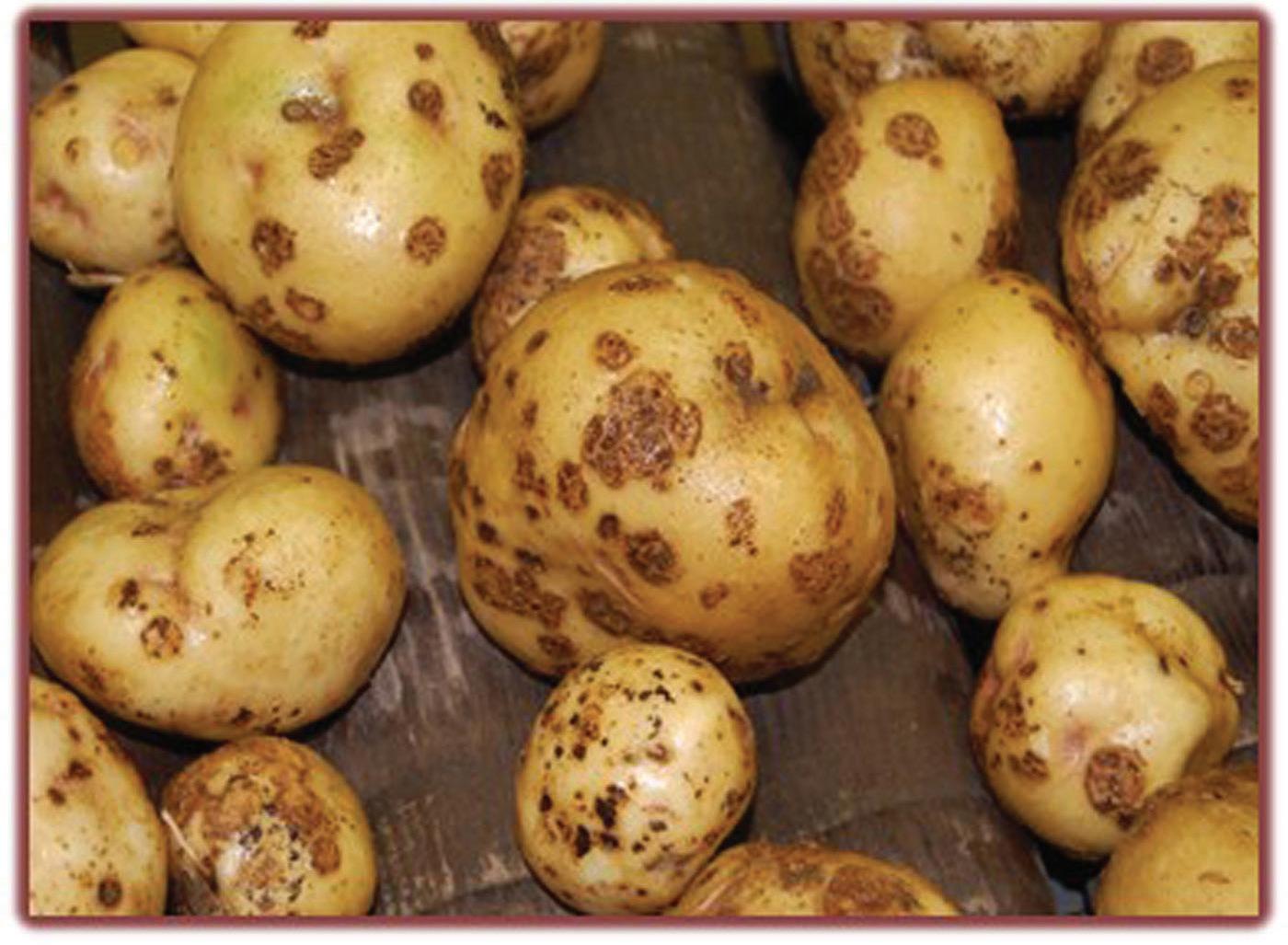
stelliscabiei, europascabiei and glauciniger.
FACTORS OF INFECTION
Many factors influence infection and severity of common scab symptoms, including diversity of soil microbial populations, soil pH, temperature and soil moisture.
Potato tubers develop common scab during the tuber initiation phase and symptoms develop into three distinct lesion types at maturity: 1) russeted superficial lesions; 2) raised corky patches that are erumpent; and 3) pitted scabs that can vary from shallow to deep pits.
It remains unclear as to what factors decisively influence lesion type, whether cultivar, pathogen species, soil type or other agroecological factors. Some of our recent work also indicates an association with pathogen species.
Management strategies have included use of cultivar resistance, crop rotation, management of water during tuberization (low moisture promotes disease), management of soil pH to ≤5.2 and pesticides. However, even combined, these approaches often provide inconsistent control of common scab.
Over the past several decades, growers and researchers have explored management programs for common scab. Control results are typically variable for most pesticides.
However, pentachloronitrobenzene (PCNB) fungicide and chloropicrin
fumigant have provided some of the most consistent and repeatable positive results in problematic fields with susceptible cultivars.
In just the past 10 years, here in Wisconsin, we have evaluated over 40 conventional and organic pesticide inputs, as well as compounds to reduce pH and auxins for common scab control.
COMMON SCAB CONTROL
PCNB (Blocker®) applied as a preplant soil treatment and chloropicrin applied as a soil fumigant prior to planting have both resulted in good and consistent common scab control across trial replications and years.
While the microbial biopesticides contain beneficial microorganisms that can inhabit the soil and have been shown to provide some common scab reduction in controlled environments, these materials were highly variable in control performance during multiple years of trialing.
Aside from pesticides and commercialized biologicals or biopesticides, we have investigated other treatments for common scab management.
We focused on reducing pH at planting with sulfur application for four years. Our goal was to apply enough sulfur (Tiger-Sul 90CR) to reduce pH from field average to 5.2. Unfortunately, these treatments gave poor common scab control.
Auxins, 1-naphthaleneacetic acid (Rejuvenate) and indole 3 butyric acid (Hortus) were trialed in our Langlade County Airport common scab nursery over several years with inconsistent results.
We aimed at targeting applications to key times in crop development, including planting (either seedapplied or in-furrow), hooking and two weeks post hooking. Outcomes of these controlled studies did not indicate reduction in common scab incidence or severity.
The disease cycle of potato common scab includes vegetative mycelium, sporogenous hypha, that hypha breaking into spores, germinating spores, the pathogen growing between and through cells, the cork layer pushing the infected area outward and scab formation.
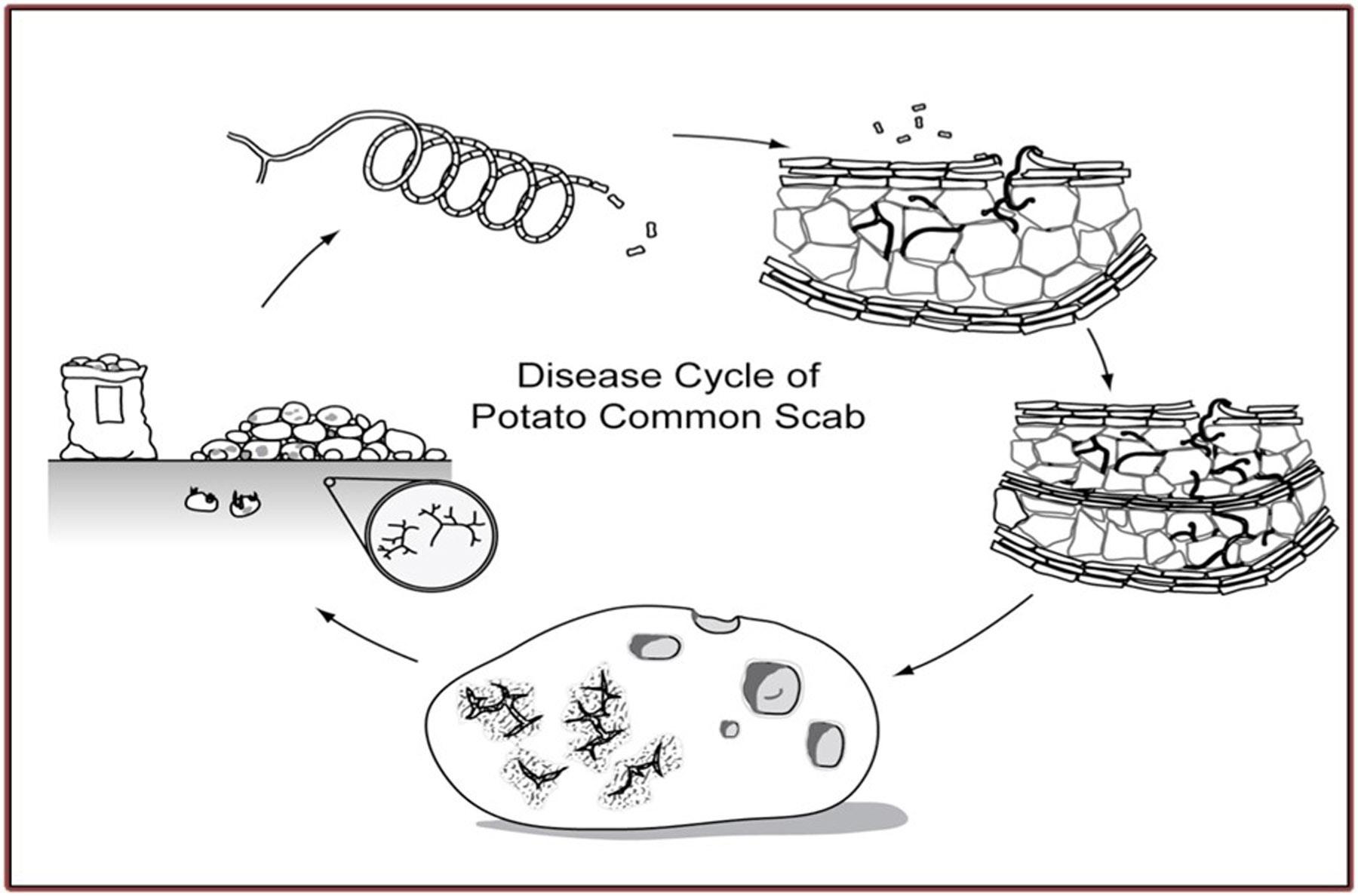
We plan to continue investigating novel approaches and treatments for common scab control in one or more locations within Wisconsin. For further information on potato disease management and fungicides, please refer to the following sources. Our Potato & Vegetable Pathology website can be sourced at: https:// vegpath.plantpath.wisc.edu/. The 2020 A3422 Commercial
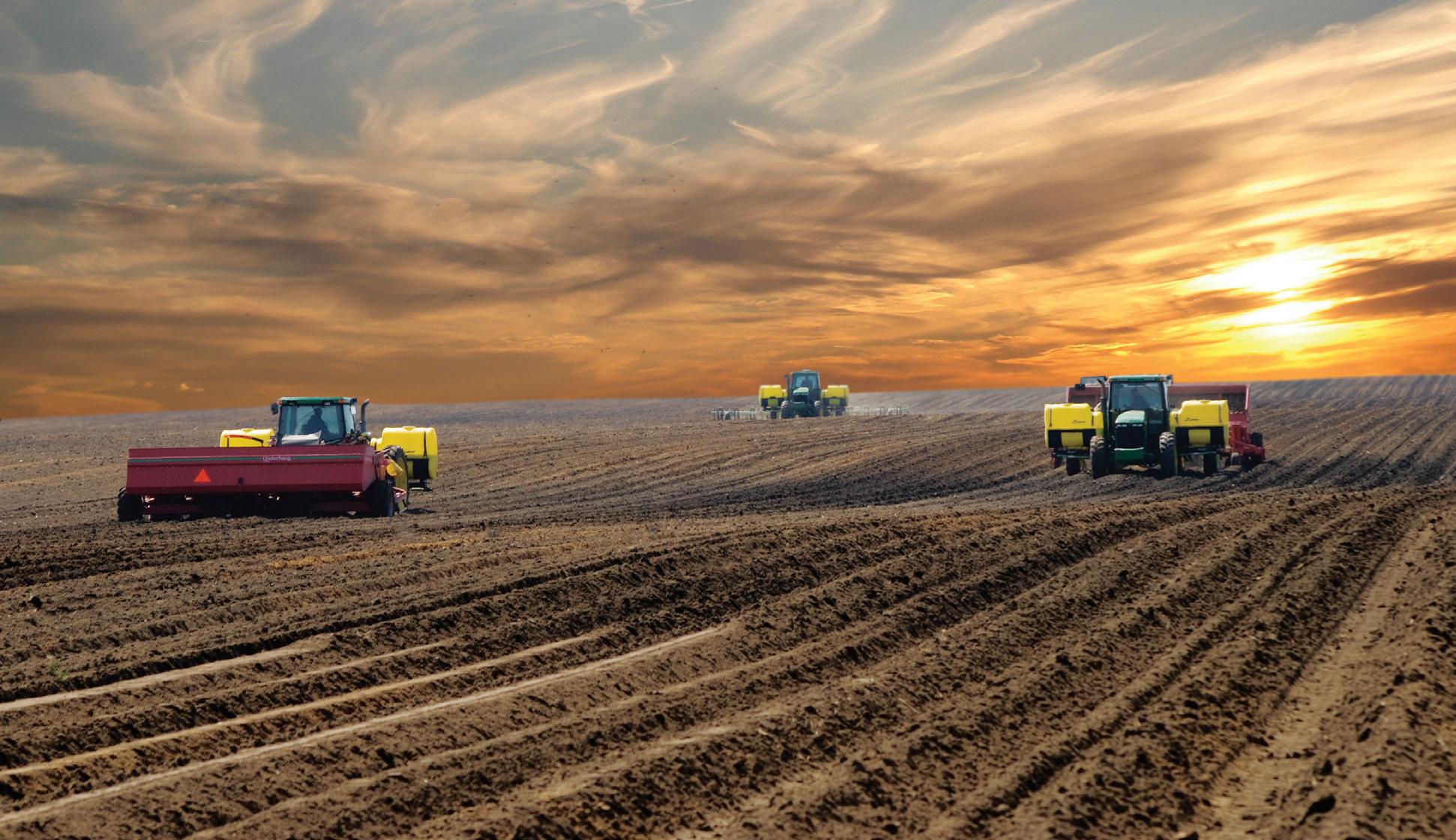
Vegetable Production in Wisconsin guide is available for purchase through the University of Wisconsin Extension Learning Store website: https://learningstore.extension.wisc. edu/products/commercial-vegetableproduction-in-wisconsin. And, a pdf of the document can be downloaded or is available at: https://cdn.shopify.com/s/ files/1/0145/8808/4272/files/A3422- 2020.pdf.
